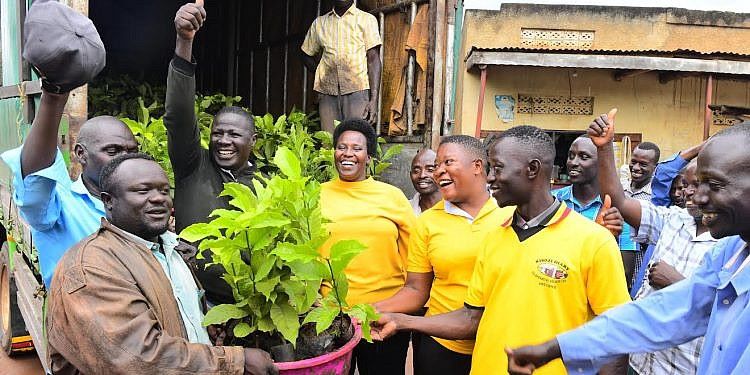SEMBABULE, September 12, 2024 – In an effort to diversify the livelihoods of pastoralists in Ssembabule and Gomba, President Yoweri Museveni has distributed 50,000 coffee seedlings to local herding communities. Traditionally, these communities are predominantly cattle keepers, but modern challenges and limited land have restricted their pastoral activities.
Museveni’s aim in the two districts is to introduce coffee production as a viable commercial venture. However, the reception of the cash crop has been lukewarm.
State House Controller Jane Barekye delivered the seedlings to enthusiastic recipients in Kirasi and Lutunku villages in Gomba and Ssembabule districts, respectively. She conveyed that President Museveni is dedicated to alleviating poverty through agricultural production.
The President, who owns a farm in Kisozi, Gomba district, has recently experienced several incidents of cattle theft, which he attributes to individuals from neighboring villages.
Sarah Nalwanga, the Poverty Alleviation Project Coordinator for Gomba and Ssembabule districts, stated that the coffee seedling distribution will continue until all interested farmers in the nine villages of Gomba and Ssembabule are reached.
“This project specifically targets the President’s neighbours in these nine villages,” Nalwanga explained. “In Gomba, there are four villages, and in Ssembabule, five villages benefiting from this initiative.”
Museveni’s poverty eradication programme, which began in 2011, initially provided goats, heifers, coffee seedlings, and later included additional support such as poultry and banana tissues.
Despite these efforts, some residents have expressed dissatisfaction with the programme. Many pastoral herders feel that the provided items are unsuitable for their traditional lifestyles.
Lazaro Kacwekano, a 56-year-old resident of Gomba, questioned the practicality of the initiative: “They gave us expensive goats that perished in the drought. Now they are giving us coffee seedlings. Where are we supposed to plant them?” He explained that their limited land is designated for cattle grazing.
Similarly, Enos Mugabe from Lutunku commented, “As cattle herders, we lack sufficient land for both coffee cultivation and grazing. Our land is needed for milk production, and thus cannot support coffee farming.”
Initially, the initiative also included financial assistance for households in the nine villages to help them generate income and improve their livelihoods. The villages benefiting from this project include Kirasi, Kisozi A, Kisozi B, and Kajumiro in Gomba, and Obutugu, Lutunku A, Lutunku B, Kasozi, and Kikuumadungu in Ssembabule. To date, at least 2,035 households have benefited from the programme.
https://thecooperator.news/tz-moves-to-safeguard-access-to-eu-coffee-market/
Buy your copy of thecooperator magazine from one of our country-wide vending points or an e-copy on emag.thecooperator.news
